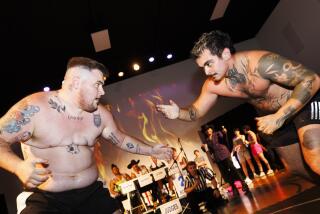Feminism in an unlikely place — a transgender beauty pageant
- Share via
A little before noon last Sunday, I pulled up outside a nightclub in Hollywood.
I had come to check out rehearsals for a beauty pageant being staged that night at Circus Disco, a kitschy bar tucked back from the street on an unglamorous stretch of Santa Monica Boulevard.
The idea of ranking women on their looks had always seemed objectionable, like a step backward from feminism. But this pageant sounded special. The Queen USA contest is billed as “the premier transgender beauty pageant in the United States.”
Past a portico topped with a statue of a dancing tiger, a side door led into a cavernous dance hall. A flock of women in workout clothes and heels were moving in formation. “Hips, hips, hips, hips!” a choreographer yelled. “I know it’s lunch time, but I want to see some energy!”
As the routine took shape, a slim woman with long blond hair looked on approvingly. Karina Samala is the reigning “Empress” of the Imperial Court of Los Angeles and Hollywood, the lesbian, gay, bisexual and transgender advocacy group that puts on the pageant every year.
Samala was born a boy in the Philippines, but says she always felt like a girl inside. As a kid, she used to sneak into her sisters’ dresses.
After immigrating to the United States in her 20s, she found a community of people like her at the drag clubs of West Hollywood, where she would do impersonations on stage (she was best as Cher).
“But I was trying to live a double life,” she said. “I had to go to work in a suit and tie and at night I would go back to being Karina, performing in gay bars.”
Samala began her medical transition to becoming a woman a decade ago, around the time she retired from her job as a senior engineer at Northrop Grumman.
She’s now involved with half a dozen advocacy groups and advisory boards, including one that helped establish transgender-only cells in Los Angeles city jails earlier this year. She’s trying to implement similar changes at Los Angeles County jails, and is also working with a nonprofit to create a free medical clinic to meet the specific health needs of transgender women.
When she’s not shuttling between meetings, Samala is checking in with the dozens of young people around Los Angeles who call her a mentor, or simply “Mother Karina.”
She pushes them to compete in pageants, which she says helps boost the confidence of a population that doesn’t often get a lot of support.
Samala knows what winning a pageant can do for self-esteem. She is a former Queen Universe.
::
The pageant was about to begin. In the dressing room backstage, it felt like prom night.
Contestant Bramyla Wilson, looking glamorous with thick curls and a sparkly red dress, was still mulling which heels to wear.
“The silver ones?” Wilson asked.
“The silver ones,” her friend, Kimora Belisle, agreed.
Wilson moved here from Alabama a few years ago. When I asked her how the transgender community in L.A. compares to the one back home, she looked at me like I was crazy. “There is no community in Alabama,” she said.
Before taking the stage, Wilson clasped hands with her rivals in a circle. Each was at a different stage of their transition. Some had had plastic surgery, others had not. Many were immigrants, from Asia or Latin America.
“By the grace of God we are still here,” Wilson prayed. “We are still standing strong.”
Then they strutted on stage. The crowd went wild as they flipped their hair, pursed their lips and batted their eyelashes. A panel of judges — including a plastic surgeon and two West Hollywood city councilmen — took note.
“They put some women to shame,” a man in the crowd said to me during the swimsuit competition.
I was taken aback.
Sure, the women on stage were good. Some were Miss America good, and had the cliched gestures of femininity down pat.
But isn’t there more to being a woman?
Backstage, Juliana Giessel was celebrating her win in the swimsuit contest. During opening introductions onstage, she had pumped a fist in the air and declared, “I am a woman!”
Giessel said few women who are born women feel they can be “overtly feminine” these days because they’re expected to compete with men in school and in the workplace.
In simpler terms, she was saying feminism killed femininity.
But that misses the point.
What the women’s movement has done is open up opportunities. Just look at Carmen Hinayon, who won the Queen USA crown in 2009. This fall, Hinayon will start at UCLA law school so she can take her fight for lesbian, gay, bisexual and transgender rights to the courts.
Fifty years ago, law school was rare for any woman, transgender or not.
There are countless expressions of womanhood now, from female Olympic gymnasts to women cops to moms who decide to stay home with their kids.
And those who choose to compete in beauty pageants, Queen USA included — well, that’s an authentic expression, too.
But are we ready to accept them for who they are?
Later that night, during a question-and-answer session, the contestants ticked off harrowing incidents of violence and discrimination they have faced simply for being themselves.
“We are existing,” one contestant said.
“We will be a part of your world whether you like it or not,” vowed another.
Beyond the flashy lashes and shiny lips, strength and determination shone through. And it was clear that those are qualities of womanhood, too.



